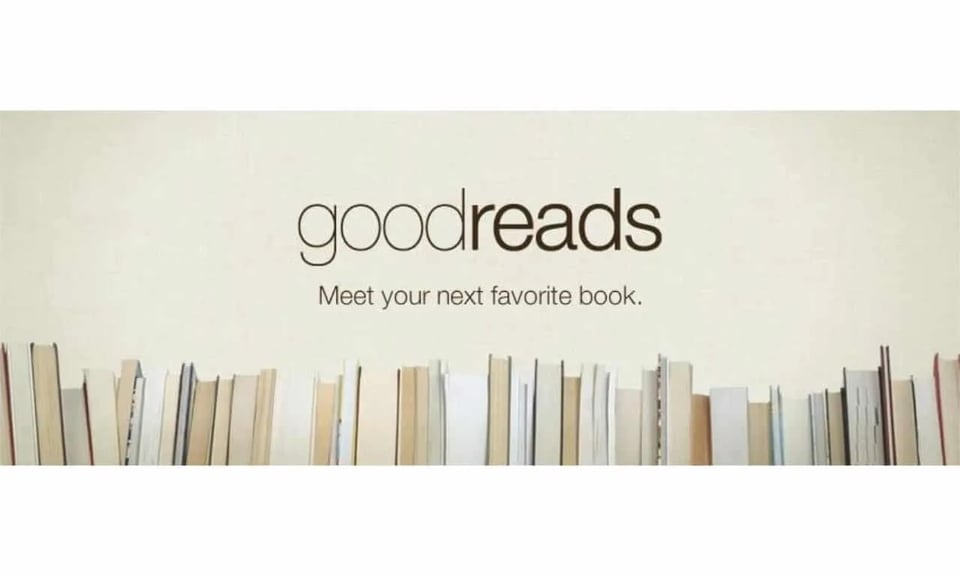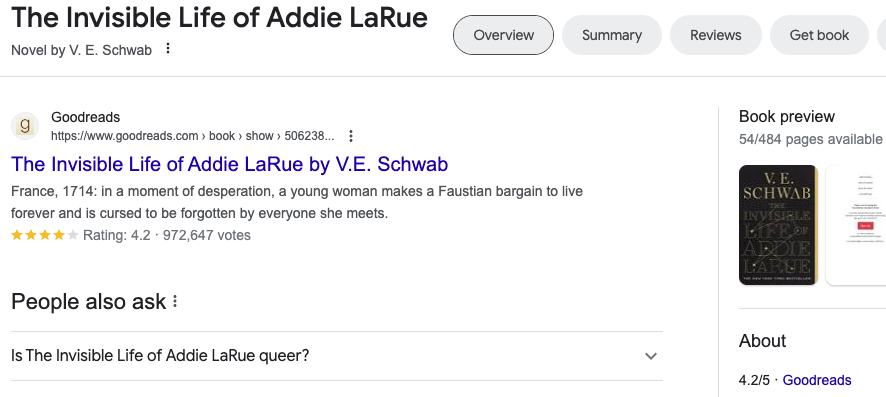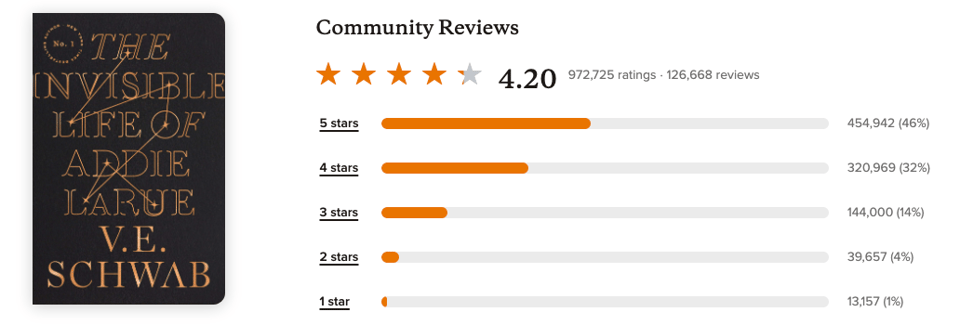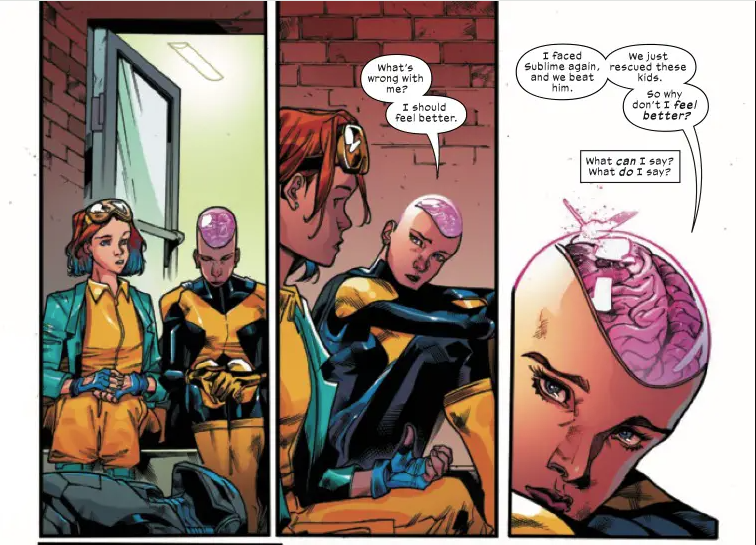How To Fix Goodreads

Last week, a nauseating scandal hit the book world. Basically, a white author created fake accounts on Goodreads, and used them to leave a slew of one-star ratings on books by debut authors of color whom she thought of as her competition. (You can read all the revolting details here.)
I find this utterly depressing — not just because of the amount of work that went into being racist and destructive, but also because it's the ultimate of expression of this idea that authors are always in competition with each other. This is such a toxic way of looking at things, and feels like a terrible misunderstanding of the book world. In my experience, we're all in this together, and anything that gets people excited about reading is good for all of us. Especially now, when small-minded fail-demons are trying to ban books and deprive teenagers of discovering the pleasure of reading, it's a really bad time for authors to be trashing each other's books.
There's also just the fact that for me, one of the great joys of the book world is falling in love with new books and getting to shout about them. I write, in large part, because I love books and reading, and I can't imagine anything more depressing than living in a world where other authors become merely my foes in some battle for supremacy. Ugh.
But that's not what I wanted to write about today. Instead, I wanted to write about Goodreads, and how to fix the problems with the site.
Because I'll be honest: when I first heard about this review-bombing business, my first reaction was: I bet it happens all the time, and people usually don't get caught. (I have a nasty cynical streak sometimes, which helps me to come up with awful things that can happen to my characters.) The only reason this particular author's review-bombing campaign was thwarted was because she was so unsubtle and clumsy about it. If she'd been a little more careful, nobody would ever know.
And Goodreads, sadly, has a huge problem with review-bombing in general. I've seen it over and over: anytime a new book by a marginalized author is announced, trolls start leaving one-star reviews before even the book's editor has had a chance to read it.
NPR just reported that Goodreads is asking users to flag suspicious accounts, and that they're stepping up their efforts to stop large-scale review-bombing (when a single book gets swamped by thousands of disingenuous one-star reviews.) But there's no real plan to stop lower-level review bombing, of the type that happens constantly. That problem will require a more systematic approach.
One solution that's floated pretty often is for Goodreads to implement the same rule that its parent company Amazon uses: no reviews can be posted until a book has been published. The trouble is, publishers and authors currently rely on early reviews of their books to get the word out, and this is why books are so widely available on NetGalley and Edelweiss. So a lot of authors, especially newer authors, would be hurt by this move.
Instead, I'd suggest a different approach: changing the star-rating system, or the way that it's aggregated.
A personal story: For years, I was rating tracks on iTunes using one to five stars. Sometimes I would make a playlist that contained only tracks with four or five stars. I found myself putting a lot of thought into whether something was a three-star track or a four-star track. (Did I love this song? Or merely sort of like it?)
Then that computer got lost or wiped, and my iTunes data with it — but I still had all my music, thank goodness. When I started using iTunes again, I realized that I didn't have the spoons to do the whole one-to-five-stars thing again. And there was no need, because I discovered iTunes had another feature: you could "favorite" a song, or you could "dislike" a song. In my older iTunes, this showed up as a heart or a broken heart, but in the latest version, it shows up as a star or a thumbs down:

This was much simpler! The songs that I really enjoyed, the ones that I wanted to put into heavy rotation, I would give a heart to. Everything else, I wouldn't bother to label at all — except for a very small number of songs that I actively disliked and for some reason didn't just delete.
Not only did this require less fiddly concentration, it also boiled down things things down to a pretty simple question: do I want to listen to this song all the time? Is this one of my favorites, or just a song that I might or might not skip when it comes up?
And I feel like with books, it's pretty similar. Did you like this book or not? Would you recommend it to your friends? Would you look out for more books by this author in future? The important questions are all yes or no.
Another brief story: when I was reviewing books, movies, and TV shows for io9, our bosses really wanted me to rate everything with letter grades, from A to F. I pushed back on this, because I wanted people to actually read the reviews and understand the nuance of what I was saying about the movie or book. I'd always rather get granular and discuss what worked and what didn't, than provide a grade as if I was a teacher. I also didn't want my movie reviews posted on Rotten Tomatoes, no matter how often my bosses urged me to put them there, because I hated the idea of film criticism being boiled down to "fresh" or "rotten."
So when I started leaving reviews on Goodreads, for a while, I gave every book zero stars so as not to participate. Then I switched to giving every book five stars, because I figured that a lot of the authors I was reviewing were probably getting review-bombed, and I should try to counteract it.
So what I'm getting at here is that my personal preference would be for Goodreads to ditch the star-rating system entirely, and either switch to thumbs up/thumbs down, or nothing at all.
That said, I understand that folks on Goodreads really enjoy the star-rating system. I often see reviews where people explain in depth the reasoning that went into their choice of three stars versus four stars. And I don't think that the star rating system is the real problem, even if it's clearly not my cup of tea.
Instead, I would say the problem is with the aggregation.
The reason review-bombing works is because Goodreads presents every single book with a single number: the average of all of the star ratings that have been submitted. This number is essentially meaningless, because different people have different ideas of what three stars mean. And that's before you consider the fake reviews, as well as the reviews from folks who only read the first two pages of a book or simply didn't like the cover art. Unfortunately, people take that single number way too seriously, and at times I've seen it presented on Google as a key fact about a book.

So my preferred approach to review bombing would be to change the aggregation. One approach is just not to present any single number about a book. You can still have a chart showing the percentage of people who gave it different ratings, as exists now:

But there's no need to boil that down to a single number.
Books aren't sandwiches. They aren't Uber rides, either. Even more than most other things, how we feel about books is necessarily subjective, and you have to read a whole review to understand what someone was looking for, and whether they found it. (Most people will agree that a BLT should contain bacon, and that the bacon should be crispy. Books are... more complicated.)
If you really want to have a single number next to each book, one option is present the raw number of how many people rated it better than three stars. If five hundred people thought a book deserved a four- or five-star rating, that's pretty useful info. (This, too, could be gamed. But so can any single-number metric.)
When it comes to books, love is more interesting than hate, as a rule — when I talk to my friends, I ask what books they've liked lately, not what books they've hated. I want to hear their book recommendations. And again, plenty of evil goblins are trying to keep us from reading books right now — so I think celebrating the books we love should be a higher priority than trashing the books we hate. (Unless a book is actually racist or otherwise deeply problematic, in which case never mind.)
And here's where I admit that I will sometimes go and read the one-star or two-star reviews on Goodreads. I find it one of the most useful features of the site. When I'm trying to decide whether to pick up a particular book, it's sometimes helpful to learn why some people didn't enjoy it. In particular, if a ton of one-star reviewers all mention that a book does a certain thing that annoys me, I will definitely take that into consideration. But again: you have to read the actual reviews to get the context. The number by itself tells you nothing.
If Goodreads doesn't want to scrap the average rating, I would suggest hacking it. This could even be a use case for the large language models (aka fake A.I.) that everybody is trying to make use of right now. Goodreads could assign weights to people's ratings, depending on whether they posted a full review of the book, a few words, or no review whatsoever. To prevent people from copy-pasting garbage text, Goodreads would need to have an algorithm looking for obviously irrelevant or lorem-ipsum-ish sentences. Goodreads could give the strongest weighting to a review which mentions the names of some of the characters or some of the key events in the book. Since Goodreads is owned by Amazon, it could also give a higher weight to verified purchasers.
Yet another option: instead of presenting a single number for everybody, Goodreads could present the average rating among your friends, or people you follow. (This could also be friends of friends, for a more robust average.) That would add more usefulness to the social aspect of Goodreads, and encourage people to make friends on there. It would also make it harder for sock puppets to get much traction, unless they convinced a ton of people to follow them somehow.
Again, I find Goodreads extremely useful. And part of its usefulness includes those one-star reviews, which sometimes provide an important perspective on books from people who have legitimate complaints. But I'd love to see Goodreads change its system to foreground other information and help people fall in love with the exact sort of books that tend to be inundated with one-star reviews from malicious actors.
And here's where I disclose a slight conflict of interest and make a shameless plug: I'm currently writing monthly reviews of science fiction and fantasy books for the Washington Post. (My final review column of 2023 should be out in the next day or so.) As essential as I find Goodreads to be, I still think nothing can replace the role of newspaper and magazine reviews, telling people who might not be aware of science fiction and fantasy which books are worth checking out right now. If we want a truly robust ecosystem of book reviews, then I urge everybody to click on more book reviews in the Post, the Times, and any other newspaper that still runs them. If we don't support professional book reviews, they absolutely will go away — and nothing, not even Goodreads, will replace them.
Stuff I Love Right Now
Fellow Travelers on Showtime is just an astonishingly good TV show. I paid for a month of Showtime via Hulu and have zero regrets, because this show is that good. It's basically a thorny, fucked up love story between State Department bureaucrat Hawkins Fuller (Matt Bomer) and Congressional aide Tim Laughlin (Jonathan Bailey) during the height of the McCarthy witch hunts in 1952. And then the two men reunite in the 1980s, during the AIDS crisis. It feels like an essential companion to It's a Sin, another show about gay history I've loved recently. (Also recommended: A League of Their Own and Vida, for more lesbians, past and present.) It's sometimes shocking to realize how recently gays and lesbians gained civil rights, and how easily we could slide backward. (Once they're done with trans people, presumably.)
Also! There's a new season of Hilda on Netflix. I somehow thought this show was over, after they aired a TV movie that wrapped up all of the main storylines. Bella Ramsey (The Last of Us) voices Hilda, an adventurous girl who lives with her mother in Trollberg, a bustling city surrounded by rock trolls. It's utterly charming and gorgeous, and worth watching just for Hilda's trusty pet deerfox, Twig.
Oh also, in case it wasn't clear before, The Light by Afrika Bambaataa is a massively underrated album that includes George Clinton, Bootsy Collins, Sly & Robbie, and a ton of others. It blends Go-Go, funk, hip hop and other music styles beautifully. (Though much as I love Boy George, I don't think they shoulda let him anywhere near that Curtis Mayfield song, I'm sorry.)
My Stuff
You can pre-order the collected edition of New Mutants: Lethal Legion, the miniseries I wrote for Marvel starring the character I co-created, Escapade. (This trade paperback is currently discounted on Bookshop, so I'd jump on this now.) In Lethal Legion, Escapade wants to cheer up her friend Cerebella after the scary events of New Mutants 31-33 (which are collected in New Mutants Vol. 4, now available) so Escapade suggests doing her favorite thing: stealing from the rich! Unfortunately, they decide to rob a former supervillain, who turns out to be not so former. I always like stories about characters who get themselves into scrapes through their own choices, rather than just reacting to a villain's evil deeds.

Also! You can pre-order the paperback of Promises Stronger Than Darkness, the third book of my Unstoppable trilogy. The stars are dying, the whole galaxy is in danger, and the one hero who could have helped is no longer around. What do Elza, Rachael, and the other teen heroes do? A heist! (Okay, so a theme is starting to emerge. I like weird/silly heists and cannot lie.) I'm stoked that the whole trilogy will be out in paperback as of April — and right now, the third book is just $12 to pre-order on Bookshop.
The latest episode of the Our Opinions Are Correct podcast is about Doctor Who. Annalee Newitz and I discuss why the Time Lord has stood the test of time, and if there are any lessons that other long-running series could learn. (And we squee about how much we've been loving the show's return lately.)